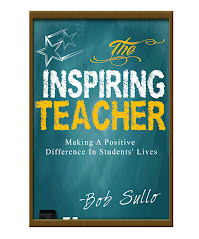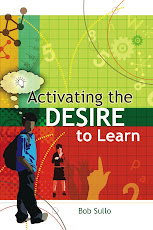Someone who read
“Natural Consequences and Responsibility” was kind enough to send me an e-mail that impressed me for two specific
reasons: it offered a wonderful example of self-evaluation in action and it
incorporated the serious reflection needed to help our schools improve.
Her school attempts to implement many ideas advocated
by Dr. Glasser and choice theory, including the use of a “connecting room.”
After reading
“Natural Consequences and Responsibility,” she decided to
evaluate if what they do matches what they want and reflects what a “connecting
room” should be. She discovered that many students sent to the connecting room
are unable to articulate why they have been sent there. Others seem truly
mystified about why they are there at all! Still, following protocol, the
students are required to complete a form that identifies what they did, what
they wanted, and what better choices they can make in the future. Despite the
positive intent of the connecting room, the reader believes many students view
it as a punitive place and simply “play the game” by telling teachers what they
want to hear. Her e-mail ended with the following words: “There is a better way
of doing this, I believe. I have begun to question the value of what we do.”
That’s self-evaluation in action. Self-evaluation
isn’t only looking at where you are and developing a plan of action. It’s
revisiting the issue after a plan has been implemented and assessing how well
it matches what you envisioned. We might not always like what we find out. This
reader had the courage to do that.
Her e-mail also represents the kind of considered
reflection needed for sustainable school improvement. I work with a number of
schools that try to apply the principles of choice theory. Unfortunately, many
of them blindly “drink the kool-aid” and fail to deeply evaluate and question
their practices. Once they establish a “connecting room,” for example, they
naively believe they have effectively transitioned from punishment. Changing
labels isn’t the same as changing practices. To make genuine gains, we need to
question what we do. That takes courage. Those who question are frequently
perceived negatively, seen as “not on board,” accused of not being a “team
player,” and suspected of undermining school leadership. All of that may be true. But oftentimes, those who ask difficult
questions are our best advocates. They appreciate that quality requires hard
work and commitment and is not achieved easily.
Building leaders, be grateful if your staff has some
of these deep thinkers, these reasonable skeptics. And if you are one of those
staff members who asks the difficult questions that inspires us to reflect,
think deeply, and continually assess what we’re doing, I would be delighted to
work with you.
***
As always, if you enjoyed this and found it useful, please
send the link to your friends. Thanks.
Bob Sullo
PO Box 1336
Sandwich, MA 02563
For information about books by Bob Sullo and to schedule a
keynote, workshop, or series for your school, agency, or parent group visit
www.internalmotivation.net






No comments:
Post a Comment